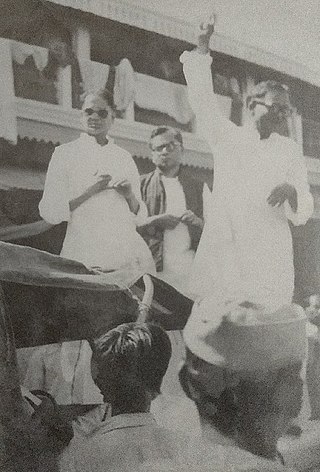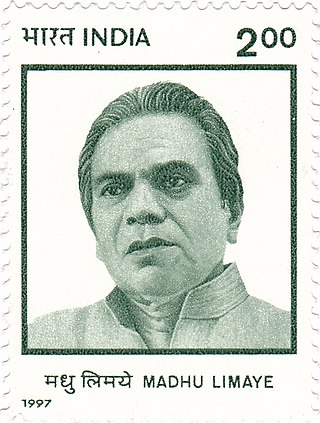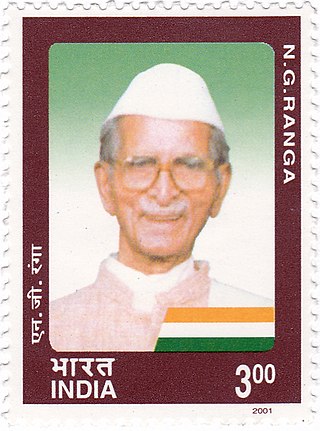
The Chinese Communist Party (CCP), officially the Communist Party of China (CPC), is the founding and sole ruling party of the People's Republic of China (PRC). Under the leadership of Mao Zedong, the CCP emerged victorious in the Chinese Civil War against the Kuomintang. In 1949, Mao proclaimed the establishment of the People's Republic of China. Since then, the CCP has governed China and has sole control over the People's Liberation Army (PLA). Each successive leader of the CCP has added their own theories to the party's constitution, which outlines the ideology of the party, collectively referred to as socialism with Chinese characteristics. As of 2023, the CCP has more than 98 million members, making it the second largest political party by membership in the world after India's Bharatiya Janata Party.

The Indian National Congress (INC), colloquially the Congress Party or simply the Congress, is a political party in India with widespread roots. Founded in 1885, it was the first modern nationalist movement to emerge in the British Empire in Asia and Africa. From the late 19th century, and especially after 1920, under the leadership of Mahatma Gandhi, the Congress became the principal leader of the Indian independence movement. The Congress led India to independence from the United Kingdom, and significantly influenced other anti-colonial nationalist movements in the British Empire.

The Arab Socialist Baʿth Party was a political party founded in Syria by Mishel ʿAflaq, Ṣalāḥ al-Dīn al-Bīṭār, and associates of Zakī al-ʾArsūzī. The party espoused Baʿthism, which is an ideology mixing Arab nationalist, pan-Arabism, Arab socialist, and anti-imperialist interests. Baʿthism calls for unification of the Arab world into a single state. Its motto, "Unity, Liberty, Socialism", refers to Arab unity, and freedom from non-Arab control and interference.

A communist state, also known as a Marxist–Leninist state, is a one-party state that is administered and governed by a communist party guided by Marxism–Leninism. Marxism–Leninism was the state ideology of the Soviet Union, the Comintern after Bolshevisation and the communist states within the Comecon, the Eastern Bloc, and the Warsaw Pact. Marxism–Leninism currently still remains the ideology of a few parties around the world. After its peak when many communist states were established, the Revolutions of 1989 brought down most of the communist states, however, it is still the official ideology of the ruling parties of China, Cuba, Laos, Vietnam, and to a lesser extent, North Korea. During most of the 20th century, before the Revolutions of 1989, around one-third of the world's population lived under communist states.

The Communist Party of Vietnam (CPV), also known as the Vietnamese Communist Party (VCP), is the founding and sole legal party of the Socialist Republic of Vietnam. Founded in 1930 by Hồ Chí Minh, the CPV became the ruling party of North Vietnam in 1954 and then all of Vietnam after the collapse of the South Vietnamese government following the Fall of Saigon in 1975. Although it nominally exists alongside the Vietnamese Fatherland Front, it maintains a unitary government and has centralized control over the state, military, and media. The supremacy of the CPV is guaranteed by Article 4 of the national constitution. The Vietnamese public generally refer to the CPV as simply "the Party" or "our Party".

The Communist Party of India (CPI) is the oldest communist party in India. The CPI was founded in modern-day Kanpur on 26 December 1925.

The Janata Party was a political party that was founded as an amalgam of Indian political parties opposed to the Emergency that was imposed between 1975 and 1977 by Prime Minister Indira Gandhi of the Indian National Congress. In the 1977 general election, the party defeated the Congress and Janata leader Morarji Desai became the first non-Congress prime minister in independent modern India's history.

Revolutionary Socialist Party (RSP) is a communist party in India. The party was founded on 19 March 1940 by Tridib Chaudhuri and has its roots in the Bengali liberation movement Anushilan Samiti and the Hindustan Socialist Republican Army.

Bharatiya Lok Dal was a political party in India. The BLD or simply BL was formed at the end of 1974 through the fusion of seven parties opposed to the rule of Indira Gandhi, including the Swatantra Party, the Utkal Congress, the Bharatiya Kranti Dal, and the Socialist Party. The leader of the BLD was Charan Singh.

The Congress Socialist Party (CSP) was a socialist caucus within the Indian National Congress. It was founded in 1934 by Congress members who rejected what they saw as the anti-rational mysticism of Gandhi as well as the sectarian attitude of the Communist Party of India towards the Congress. Influenced by Fabianism as well as Marxism-Leninism, the CSP included advocates of armed struggle or sabotage (such as Yusuf Meherally, Jai Prakash Narayan, and Basawon Singh as well as those who insisted upon Ahimsa or Nonviolent resistance. The CSP advocated decentralized socialism in which co-operatives, trade unions, independent farmers, and local authorities would hold a substantial share of the economic power.

Indian nationalism is an instance of territorial nationalism, which is inclusive of all of the people of India, despite their diverse ethnic, linguistic and religious backgrounds. Indian nationalism can trace roots to pre-colonial India, but was fully developed during the Indian independence movement which campaigned for independence from British rule. Indian nationalism quickly rose to popularity in India through these united anti-colonial coalitions and movements. Independence movement figures like Mahatma Gandhi and Jawaharlal Nehru spearheaded the Indian nationalist movement. After Indian Independence, Nehru and his successors continued to campaign on Indian nationalism in face of border wars with both China and Pakistan. After the Indo-Pakistan War of 1971 and the Bangladesh Liberation War, Indian nationalism reached its post-independence peak. However by the 1980s, religious tensions reached a melting point and Indian nationalism sluggishly collapsed. Despite its decline and the rise of religious nationalism; Indian nationalism and its historic figures continue to strongly influence the politics of India and reflect an opposition to the sectarian strands of Hindu nationalism and Muslim nationalism.

Jivatram Bhagwandas Kripalani, popularly known as Acharya Kripalani, was an Indian politician, noted particularly for holding the presidency of the Indian National Congress during the transfer of power in 1947 and the husband of Sucheta Kripalani. Kripalani was an environmentalist, mystic and independence activist who was long a Gandhian socialist, before joining the economically right wing Swatantra Party later in life.

Anushilan Samiti was an Indian fitness club, which was actually used as an underground society for anti-British revolutionaries. In the first quarter of the 20th century it supported revolutionary violence as the means for ending British rule in India. The organisation arose from a conglomeration of local youth groups and gyms (akhara) in Bengal in 1902. It had two prominent, somewhat independent, arms in East and West Bengal, Dhaka Anushilan Samiti, and the Jugantar group.

Madhu Limaye, full name: Madhukar Ramchandra Limaye, was an Indian socialist essayist and activist, particularly active in the 1970s. A follower of Ram Manohar Lohia and a fellow-traveller of George Fernandes, he was active in the Janata government that gained power at the Centre following the Emergency. He, with Raj Narain and Krishan Kant was also responsible for the collapse of the Morarji Desai-led Janata government installed by that coalition, by insisting that no member of the Janata Party could simultaneously be a member of an alternative social or political organisation. This attack on dual membership was directed specifically at members of the Janata Party who had been members of the Jan Sangh, and continued to be members of the right-wing Rashtriya Swayamsevak Sangh (RSS), the Jan Sangh's ideological parent. The issue led to fall of the Janata government in 1979, and the destruction of the Janata coalition.

Acharya Nidubrolu Gogineni Ranga Nayukulu, also known as N. G. Ranga, was an Indian freedom fighter, classical liberal, parliamentarian and farmers' leader. He was the founding president of the Swatantra Party, and an exponent of the peasant philosophy. He received the Padma Vibhushan award for his contributions to the Peasant Movement. N.G. Ranga served in the Indian Parliament for six decades, from 1930 to 1991.

Yogendra Shukla was an Indian nationalist and freedom fighter from Bihar. He served in the Cellular Jail, and he was among the founders of Hindustan Socialist Republican Association (HSRA). Along with Basawon Singh (Sinha) he was among the founder members of the Congress Socialist Party from Bihar.

The Socialist Patriotic Youth League is a North Korean youth organization. It is the main youth organization in North Korea. Directly under the party Central Committee, it is the only mass organization expressly mentioned in the charter of the Workers' Party of Korea. Youth under 15 may join the Young Pioneer Corps, itself a part of the larger Korean Children's Union. The organization, modeled after the Komsomol in the former Soviet Union, includes all North Koreans without party membership between the ages of 15 and 30, although married women who opt to become housewives are transferred to the Socialist Women's Union. Officially, the guiding ideology of the organization is Kimilsungism–Kimjongilism.

The 6th Congress of the Workers' Party of Korea (WPK) was held in the February 8 House of Culture in Pyongyang, North Korea, from 10 to 14 October 1980. The congress is the highest organ of the party, and is stipulated to be held every four years. 3,062 delegates represented the party's membership; 117 foreign delegates attended the congress, without the right to speak. The congress saw the reappointment of Kim Il Sung as WPK General Secretary and the Presidium of the Politburo established as the highest organ of the party between congresses.
The ideology of the Chinese Communist Party has undergone dramatic changes throughout the years, especially during Deng Xiaoping's leadership and the contemporary leadership of Xi Jinping.

Xi Jinping Thought on Socialism with Chinese Characteristics for a New Era, commonly abbreviated outside China as Xi Jinping Thought or Xi'ism, is an ideological doctrine created during General Secretary Xi Jinping's leadership of the Chinese Communist Party (CCP) that combines Chinese Marxism and national rejuvenation. According to the CCP, Xi Jinping Thought "builds on and further enriches" previous party ideologies and has also been called as the "Marxism of contemporary China and of the 21st century". It consists of 14-point fundamental principles, which were announced together with Xi Jinping Thought.


















